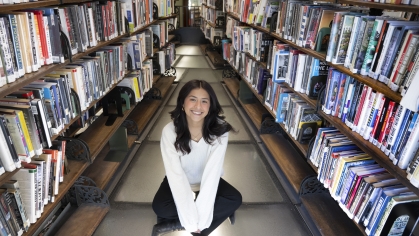The Daniel Jordan Fiddle Foundation Fellows Provide Critical Resources to Adults with Autism and their Caregivers
Each year, with generous support from The Daniel Jordan Fiddle Foundation, Rutgers School of Social Work selects a small group of MSW students to serve as Daniel Jordan Fiddle Foundation Fellows. One of the Fellows’ primary responsibilities is contributing to The Adult Autism Resource Guide for caregivers to adults living with autism. The web-based guide provides an essential service to an underserved community that enhances access to information in a user-friendly format. This database consists of more than 150 agencies and services throughout New Jersey and the United States searchable by location, as well as service type (e.g., housing, support groups, recreational activities, and more). The Fellows also complete their practicum learning hours in placements that serve children and adults with autism.
Lauren Snedeker, Assistant Professor of Teaching and Director of the MSW Certificate Program on Aging & Health, coordinates The Daniel Jordan Fiddle Foundation Fellowship. “This year’s Fellows worked hard on completing projects that focused on supporting families approaching a transition in services from the school environment to the community environment,” said Dr. Snedeker. “Each Fellow thoughtfully designed programming and resources that responded to practical and emotional needs to help prepare families and adults living with autism for this next step in their living experience. I am so proud of their work and dedication to this population.”
The students are the only fellows in the United States serving as direct care clinicians for the family members of adults with autism. Linda J. Walder, Founder and CEO of The Daniel Jordan Fiddle Foundation, said, “Their work is groundbreaking in that it values the ongoing support and commitment of family members in individual autism stories.”
"The resource guide is a vital companion to the direct care support provided by The Daniel Jordan Fiddle Foundation Adult Autism Fellows because it is continually updated and used as a resource for family members and adults diagnosed with autism as they navigate the complex maze of supports and services available for adults across the nation.”
MSW student Julianna August applied to become a Fellow because of her lifelong commitment to supporting and uplifting people with Autism Spectrum Disorder. This semester, she spent her practicum placement on the child study team at Red Bank Regional High School. “I have had the privilege of working with high school students and their families across the Autism spectrum, providing special education services and collaborating on areas of growth,” she explained.
“My work with the Foundation has enabled me to go beyond my practicum placement to gather resources for special education families based on their current needs,” she said. “These resources will be compiled and presented as a resource to my current students’ families. This work will also be available for future families navigating the potential uncertainty of transition from high school to life beyond. This will help, in part, to ease anxiety associated with such change.”
Sherika London, an MSW student and Fellow, sought to enhance her professional growth and deepen her impact as a social worker in the field of autism services. “Autism is deeply personal to me, as my brother is on the spectrum, and I have seen firsthand the importance of these individuals having tailored support and communication strategies,” she said.
London works with autistic children ages 3-12 at her practicum placement and adolescents ages 14-21 at her job and has gained experience supporting individuals with varying levels of verbal and nonverbal communication abilities. She utilizes a variety of interventions, devices, and speech and language therapy to facilitate communication, helping children express their needs, build social connections, develop independence, teach essential life skills, foster engagement, and promote self-regulation.
“Based on what I’ve experienced, I know that being a Fiddle fellow will expand my knowledge beyond my personal experiences and refine my skills in evidence-based interventions,” London said. “I also believe that integrating assistive communication methods with behavioral and developmental approaches can create meaningful opportunities for children and adolescents with autism. Through my learnings and projects, I aim to develop innovative strategies that empower individuals on the spectrum, strengthen family support systems, and promote inclusion in both educational and community settings.”
“More importantly, I am confident that the Fiddle Fellowship will provide me with the necessary platform to bridge research and practice, ensuring that I can advocate for and implement comprehensive, multi-faceted interventions that make a lasting difference in the lives of autistic individuals and their families.”



